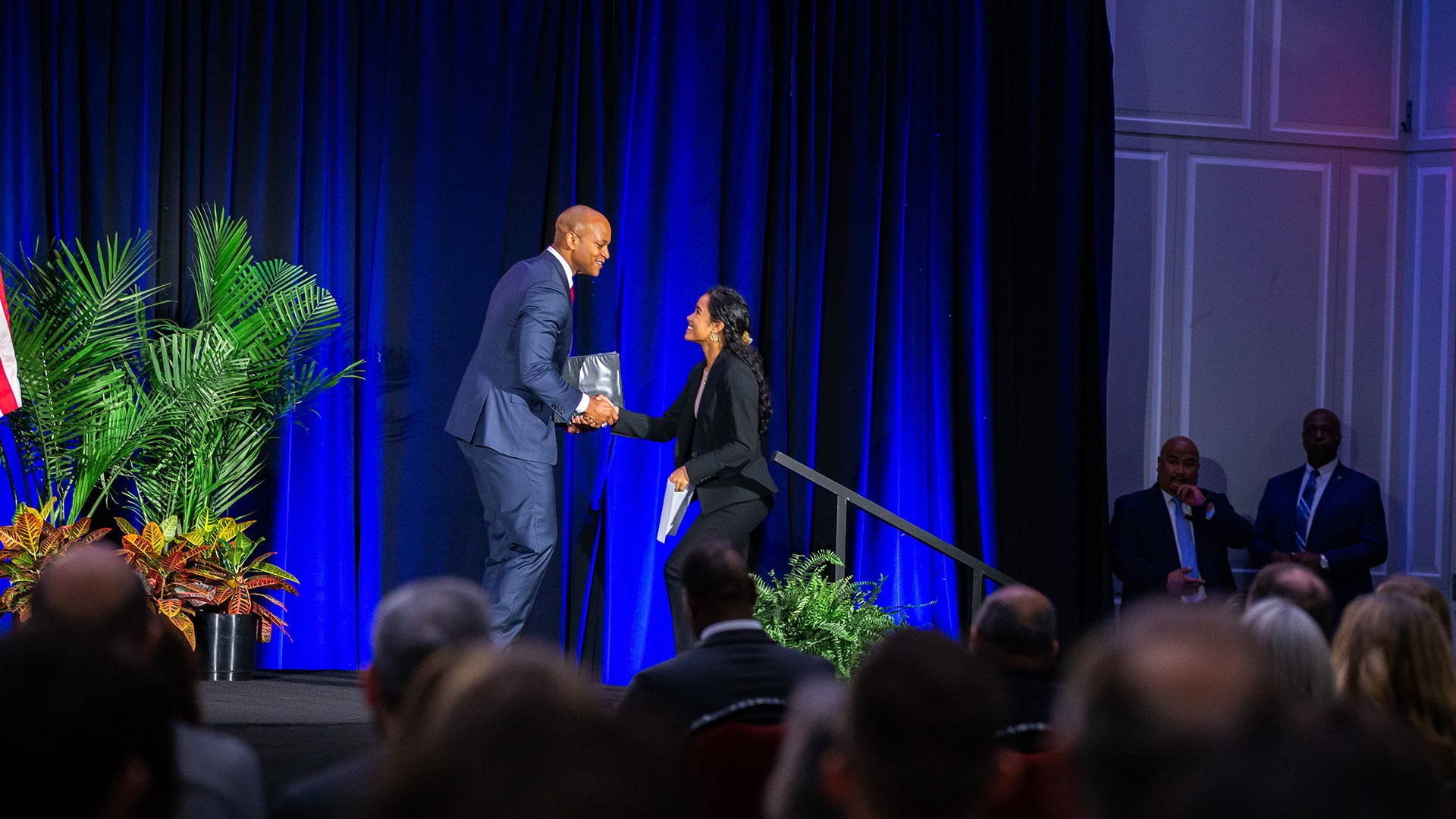Biden Administration Rolls Out New Proposed Regulations on Energy Sector at Campus Event
EPA Administrator Michael S. Regan emphasized the role of young people in fighting the climate crisis at the Samuel Riggs IV Alumni Center. Below, Maryland Gov. Wes Moore shakes hands with Anushka Tandon, an environmental science and technology major.
Image Credit: John T. Consoli
In remarks stressing the key role young people play in combating the climate crisis, the head of the U.S. Environmental Protection Agency (EPA) announced new emission-cutting standards for power plants in an event today at the University of Maryland.
National, local and state government leaders gathered with UMD students, faculty and staff in the Samuel Riggs IV Alumni Center as EPA Administrator Michael S. Regan rolled out the latest step in the Biden administration’s fight against climate change—one that could cut up to 617 million metric tons of the greenhouse gas carbon dioxide from coal and natural gas burning plants through 2042.
“There’s no question that we have a lot more work to do, but so much of what we have achieved, so much of what President Biden has achieved already, is because of you, because of the younger generation, because of your generation’s work to ensure that climate change is the topic of conversation on the world stage,” Regan told the audience. “It’s important that you never forget how vital your role is in creating and demanding a cleaner, healthier and more just world.”
Regan also announced his proposal for a National Environmental Youth Advisory Council, which would give activists as young as 16 “a seat at the table,” he said, with the opportunity to make recommendations directly to EPA staff.

Anushka Tandon, a UMD environmental science and technology major and sustainability minor who became sensitized as a child to environmental issues by the erosion and pollution of a stream near her suburban D.C. home, echoed that call to action for her fellow students.
“My generation is fighting for the future of our planet. We are fighting every day to make sure that the future is livable and healthy for all,” she said. “The climate crisis is here and will have immeasurable impacts on people’s health, our communities and our ecosystems. We must act now, and we must act swiftly.”
Regan said the proposal to limit pollution from fossil fuel-fired power plants would reduce carbon emissions equivalent to an estimated 137 million passenger vehicles, with net economic benefits up to $85 billion. It would also cut tens of thousands of tons of particulate matter, sulfur dioxide and nitrogen oxide, especially in communities disproportionately affected by high pollution and environmental injustice. By 2030, it would prevent an estimated 1,300 premature deaths, more than 300,000 asthma attacks, 800 hospital and emergency room visits, and 38,000 school absence days annually, the EPA said.
UMD’s own climate action includes commitments to make the campus carbon-neutral by 2025, to replace more than 1,000 fossil-fuel vehicles with an all-electric fleet and to decarbonize its aging energy infrastructure by 2035.
On the research front, UMD this year awarded nearly $15 million in institutional funding toward 13 climate-related initiatives through its new Grand Challenges Grants program. Two institutional projects, each receiving $3 million over three years, lead the way: Distinguished University Professor of physics Ellen Williams’ “Addressing Climate Change for a Sustainable Earth” project, which will develop systems to better predict climate-related weather disasters, and MPower Professor of environmental health Amy Sapkota’s “Global FEWture Alliance” project, which focuses on climate change impacts at the intersection of food, water, energy and public health.
“The University of Maryland is taking on what we call the grand challenges of our time, with a significant focus on research and educational programs that aim to improve environmental health and address climate change,” said Senior Vice President and Provost Jennifer King Rice. “The science is clear and the need is clear, both in how our planet is warming and how its impacts are already being felt, particularly in some of our most disadvantaged regions and neighborhoods.”
Such unity among higher education, students, state and federal government and beyond is key in the overall fight against climate change, Maryland Gov. Wes Moore said.
“Progress is only going to be real if we’re moving in partnership,” he said. “This is not a time for us to pave over the cracks. This is a time for us to fix the foundations of what’s broken in our society and in our world.”
This story was originally published by Maryland Today.